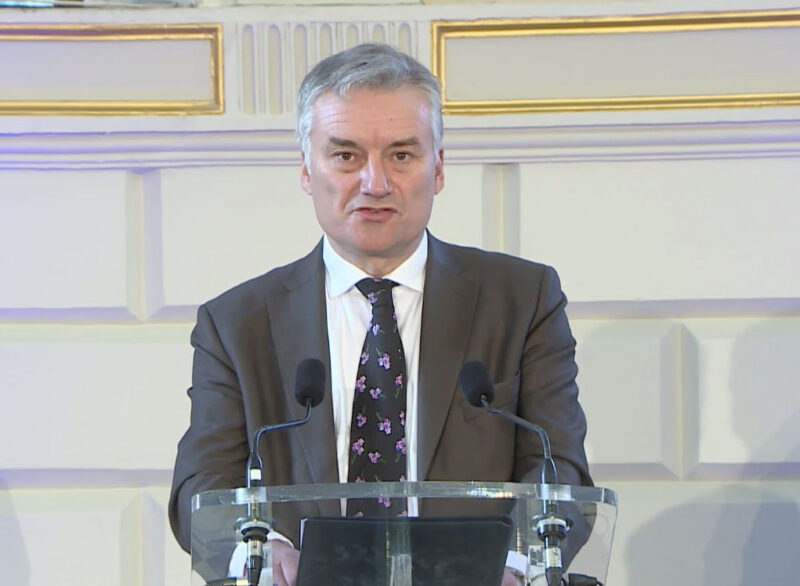The Trinity Education Project (TEP) yesterday dropped its third word and became, simply, the Trinity Education. It’s been a long journey up this point – a journey riddled with controversy, which will probably continue on for years to come.
In the online ceremony yesterday morning, Provost Patrick Prendergast said that the project “may be the most important achievement” during his time in office. He’s probably right: no other reform introduced in the past decade has changed the very nature of College so dramatically.
In the words of Vice-Provost Jurgen Barkhoff, TEP was the “biggest overhaul of our undergraduate curriculum in a generation, perhaps in the last 100 years”. Unsurprisingly, its rollout stirred up controversy and – at times – outrage among the college community.
At its core, Trinity Education – as it is now known – is about changing a students’ expectation of what they get out of College. The architects of TEP wanted to move away from summative forms of assessment – in which students are tested on what they know at the end of the year – to more formative assessments, in which students are tested more frequently throughout the year, allowing both teachers and students to adapt to their strengths and weaknesses.
Culture change is not something that happens overnight and that you can prescribe
Trinity electives and open modules would broaden students’ learning. The replacement of TSM with the joint-honours programme would allow students more flexibility to study what they wanted to. The capstone research project would allow students the chance to contribute their own original research to the field they had dedicated four years of their life to. Encouraging students to study abroad – on erasmus exchanges or for shorter weeks-long exchanges – would help students think globally.
Furthermore, TEP was about helping students think more critically and independently – independent thinking, in particular, is a word that springs up a lot in conversation with those in the know about TEP.
The Vice-Provost called these enlightened values: “Think independently, be an agent of your own destiny, freedom of choice, acting responsibly.”
TEP was rooted in an idealistic approach to learning, to what Trinity could offer students aside from mundane lecture slides and stilted conversations in tutorials. It was dynamic and ambitious, while remaining pragmatic: employability and preparing students for an ever-changing labour market was a central theme throughout.
The implementation of TEP, however, encountered a number of potholes.
Think independently, be an agent of your own destiny, freedom of choice, acting responsibly
Semesterisation and Christmas exams were particularly galling developments for students. The increased workload caused by Schools reluctant to adapt to changes coming from on high meant that extracurricular activities – also central to the aims of TEP – suffered. Students had less time and were under more pressure, so getting heavily involved in society-life took a back seat. Instead of rejigging assessments to fit into the philosophy of TEP, professors tacked on more essays and exams – leading to the exact opposite of what College wanted to happen.
New timetables caused a mass of issues. This year, delays to the open module enrollment process was a headache for students living in uncertain times. Exams became messy and more stressful – the usual three-week break before summer exams epitomised by the motto: “work 12 hours a day, seven days a week, three weeks a year” was replaced by one week of study before two sets of exams, one before summer and the other before Christmas break.
To put it bluntly: students didn’t see the idealism behind TEP. They rolled their eyes at it.

At the launch of the Trinity Education yesterday, Provost Patrick Prendergast said that TEP “may be the most important achievement” during his time in office.
This was not lost on TEP’s architects. Now that things have settled down and TEP has become Trinity Education proper, Chris Morash, former vice-provost, can reflect: “You always have to listen to what people have concerns, and you have to try to filter out what is just adapting – the kind of natural pushback of adapting to the new – to things that are being pointed out that you really have to get to terms with and fix.”
“I think it’s always difficult for the transitional group of students to do one thing and then in the middle of their degree it morphs into something else”, Morash told this newspaper.
“And I think you sort of have to take the longer term view and say: ‘Well, look, if we get this right – and we’re going to have to provide what supports we can to those students who are in that transitional group – if we get it right, it’s going to be better for the group of students who come after.’ And I think you have to take that longer-term view in order to be able to get through those difficult transitional patches.”
Aside from the enlightenment values of TEP, this more pragmatic view was prominent during the implementation of TEP: this is a tough period for students, but it will change College for the better in the years to come and is necessary.
And as this year progresses, it appears that Trinity was correct in this assessment: schools adapt – some at a snail’s pace – students sign up for their new Trinity electives, the coronavirus forces forms of assessment to change, Christmas exams become normalised, study abroad programmes ramp up, students flood the libraries preparing for their capstone projects. Trinity moves on.
The Vice-Provost described Trinity Education as an “ongoing journey”.
“Culture change”, he said, “is not something that happens overnight and that you can prescribe. You can support it, you can encourage it, you can develop structures that enable it and promote it. And I think that’s what we have done”.
You always have to listen to what people have concerns, and you have to try to filter out what is just adapting – the kind of natural pushback of adapting to the new – to things that are being pointed out that you really have to get to terms with and fix
“This is an ongoing process within the disciplines within the schools with support from college. So there’s work to be done.”
Trinity College Dublin Students’ Union (TCDSU) was central to TEP from the get go. The Vice-Provost, for example, nostalgically pointed out the crucial role that last year’s Education Officer Niamh McCay played at TEP Steering Committee meetings. “She was such an important voice.”
TEP then was a project made with students in mind and with student input. Indeed, its implementation has caused problems, but its ambition and breadth is undeniable. In her summation of TEP at yesterday’s launch McCay said: “As I enter into my final year, I’m really excited to see what’s ahead.”
“I know when I leave Trinity, I’m going to look back with pride”, she concluded. “Every corner you turn, there’s a brilliant mind.”
As life goes on in Trinity and the students who remember TEP graduate, replaced by those who consider Trinity Education as the norm, we will see what effect TEP – with its idealism and dynamism – has on these brilliant minds.







